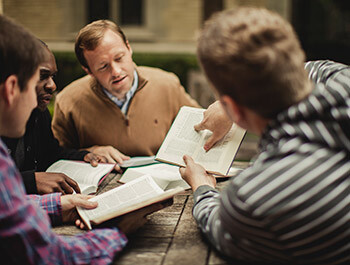Engaging in discipleship relationships
adult connect groups
Discipleship is an important process for every believer that provides intimate friendships, an environment of accountability, and most importantly, it cultivates a life rooted deeply in God’s Word. The third step in the Discipleship Pathway is to participate in a yearly Connect Group. A Connect Group is a is a small closed group of 4-8 believers who meet together weekly for the purpose of accelerated spiritual transformation. They have a meal together, study the Bible together, pray for each other, and stay connected throughout the week.
Connect Group Curriculum
Each week you will read through five passages out of our Churchwide Reading Plans found in our Home Center. You will notice in the Reading Plans that we have added questions and a journal section to help you dig into the text and gather your thoughts on how you can apply this to your daily life. There are also further reading suggestions to help you discover other passages that deal with this text's theme. You will bring your Bible and Reading Plans with you to your Connect Groups and discuss the text and questions together as a group.
The Reading Guide encourages believers to not only read their selected passages, but to also keep a H.E.A.R. Journal. (Click here to see a sample H.E.A.R. Journal.)
Bible Memorization
Throughout scripture, Bible memorization plays a vital role in the growth of every believer. Psalm 119:11 says, “I have stored up your word in my heart, that I might not sin against you.” Therefore, along with the IBC Bible Reading Plan, we are also challenging our Covenant Groups to memorize one verse per week together. This verse is also found in the Reading Guides.
CONNECT GROUP FORMATIBC Bible Reading Guide
Frequently Asked Questions
How do I find a Connect Group?
Making disciples in a Connect Group is the third step on the Discipleship Pathway because it flows out of the Life Groups. Life Groups, which form out of the Worship Services, are the “fishing ponds” for Connect Groups. As people form friendships and bonds in Life Groups, handfuls of them will decide to take the next step and begin a discipleship journey together in a Connect Group.
If you would like to be in a Connect Group, the first step on the pathway is to join a Life Group. If you are currently in a Life Group and desire to be in a Connect Group, talk to your Life Group leader or Discipleship Pastor.
How do I lead a Connect Group?
The only absolute requirement for leading a Connect Group is that you be intentionally pursuing Christ. You do not need to be a master teacher or have all of the answers; you do not need to be able to say, “Listen to me.” If you can say, “Follow me; I’m pursuing Christ,” you have the tools you need to lead a Connect Group.
As a Connect Group leader, you set the tone for the group’s atmosphere. You are not lecturing students; you are cultivating an intimate, accountable relationship with a few close friends. Joel Rosenberg and T.E. Koshy wrote in their book The Invested Life that the discipleship relationship is “more personal, more practical, and more powerful. A teacher shares information, while a discipler aims for the heart; a teacher measures knowledge, while a discipler measures faith; a teacher is an authority, while a discipler is a servant; and a teacher says, ‘Listen to me,’ while a discipler says, ‘Follow me.’”
Talk to the Discipleship Pastor if you would like to start and lead a Connect Group.
How do I choose Connect Group members?
Begin by asking God to send you a group of men or women who have a desire to learn and grow. Your Connect Group should consist of F.A.T. believers: Faithful, Available, and Teachable. A faithful person is dedicated, trustworthy, and committed. Consider a potential disciple’s faithfulness by observing other areas of his/her spiritual life, such as church attendance, Life Group involvement, or service in the church. Faithfulness is determined by a commitment to spiritual things.
Discern an individual’s availability by his willingness to meet with and invest in others. Does this person carve out time to listen, study, and learn from others? Is he accessible when called upon? Does she have a regular quiet time with God of reading the Word and praying? Availability is measured by a willingness to serve God.
Not everybody who attends a Life Group is teachable. A teachable person has a desire to learn and apply what is taught. One who is teachable is open to correction. Recognize teachability by observing one’s response to God’s Word. For example, after hearing a sermon on prayer, do they begin to pray more regularly? Or after a lesson about the dangers of the tongue, does the person implement changes in their speech? A teachable person not only listens to what is taught, but also applies it to his or her life.
After discerning that an individual is faithful, available, and teachable, prayerfully approach him or her and ask, “Would you be interested in studying the Bible, memorizing Scripture, and praying together?” Many people are open to that. All you have to do is ask. We don’t recommend that you say, “Would you like for me to disciple you?” as this question may come across in a derogatory manner.
Where should we meet?
Find a meeting place away from the church. Restaurants, coffee shops, bookstores, diners, and homes are all good options. Meeting outside the church in the community encourages your group members to publicize their faith, teaching them it is okay to read the Bible at a restaurant or pray in public. Be sure to select a place that is convenient to all group members.
How often should we meet?
Ideally, you should meet once a week for about an hour to an hour and a half. You can meet more frequently, but it is important that you meet at least once a week. This schedule does not prohibit those you are discipling from calling you throughout the week or coming by for counsel when needed. It is important to remember that discipleship is about the relationship between you and your group members, not about checking a requirement box. Disciple-making is a way of life, not a program.
When do I send out disciples to make other disciples?
Always begin with the end in mind. Your group should meet for 12 to 18 months, and they should expect that final date from the very beginning. Some groups develop a closer bond, which results in accelerated growth; others take longer. We do not recommend meeting for longer than 18 months. Some group members will desire to leave the group and begin their own groups. Others, however, will want to remain in the comfort zone of the existing group. Some will not want to start another Connect Group because of the sweet fellowship and bonds formed within the current group. Remember, the goal is for the men and the women of the group to replicate their lives into someone else.


